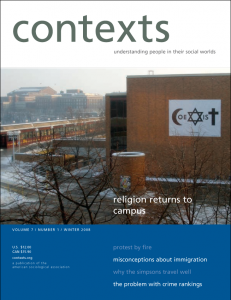
Winter 2008
Volume: 7 | Number: 1
Also in this issue, what effect has today’s wave of immigration had on American society? Does the “Hugo-centrism” of discourse about Venezuela impair our understanding of the country? And what does New York Times columnist David Brooks think about sociology today?
Normality
Despite its general neglect, normality has an extraordinarily powerful effect on how people behave. Even those who want to be different use a conception of … Read More
Keeping the Faith
After the 2004 election, political pundits credited the religious right with ushering George W. Bush into office. Adherents to the culture war thesis—that political conflict … Read More
Life, Death, and Music in West Africa
The gyil is a 14-key frame xylophone played during funerals by the Lobi people from Ghana’s northwestern region. Gyil music combines overlapping melodies and bass … Read More
David Brooks Looks for a Few Good Sociologists
While more conservative in his politics than many sociologists, Brooks often writes about topics of interest to the field and its practitioners while alternating between … Read More
Sociologists on the Colorblind Question
Sociologists today are increasingly questioning the colorblind ideology and what effects it has on American culture and law. Their interest is due in no small … Read More
The Social Structure of Hugo Chávez
Most major news magazines have covered the dramatic processes of change—constitutional reforms, referenda, marches, protests, strikes, and a coup followed by a counter-coup—Venezuela has seen … Read More
Rethinking Crime and Immigration
As an online special, we’re making this article available in its entirety. You may choose to read either the html version or a PDF … Read More
Dying for a Cause—alone?
After September 11, 2001, dying for a cause became indelibly associated with suicide attacks, at least in North America and Europe. Another kind of politically … Read More
American Scholars Return to Studying Religion
The college campus has long been perceived as one of the most secular precincts of American society. Within the academy and mass media, the secularization … Read More
Religion and Spirituality Among Scientists
Scientists are assumed to attack the religious aspects of today’s biggest social issues because they are atheists and anti-religion. But we really know very little … Read More
